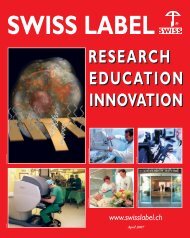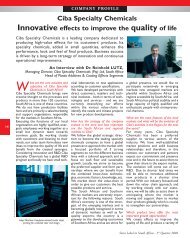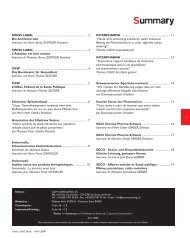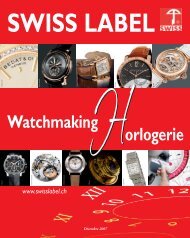SWISS LABEL INFORMATIQUE-XP - Com Consulting SA
SWISS LABEL INFORMATIQUE-XP - Com Consulting SA
SWISS LABEL INFORMATIQUE-XP - Com Consulting SA
You also want an ePaper? Increase the reach of your titles
YUMPU automatically turns print PDFs into web optimized ePapers that Google loves.
Department of pathologyand laboratory medicineInterview with Professor Jacques Bille,head of departmentThe Department of pathology and laboratory medicine includes the CHUV’s large diagnostics laboratories, along with twoinstitutes, the institute of microbiology and the institute of pathology. Several units of this department carry out cutting-edgeresearch. The department also plays an important role in training in laboratory medicine. Its director, Professor Jacques Bille,kindly agreed to answer our questions.What is the functional logic of the organisation of your department?The Institute of Pathology was a separate department until thereorganisation which grouped the institutes of microbiology andpathology together with the laboratories of clinical chemistry,immunology-allergology, haematology and medical genetics. There isa certain logic to this, as our activities do cross over with the work ofother departments, especially the clinical departments. These institutesand laboratories now have a single administrative and financialstructure. They have around 350 staff, of which 250 are technicians,what we used to call lab assistants, but which have now becomebiomedical analysis technicians. They have followed a specific trainingcourse at a professional college lasting 3-4 years.labs). A few class-3 micro-organisms are worked on in protected areas,for example HIV, the tuberculosis agent and substances that mightpotentially contain agents of bioterrorism like anthrax. The majorityof micro-organisms are in class 2. Those in class 4 frighten peoplebecause there is no treatment for them, like the African viralhaemorrhaging fevers.How do you train in laboratory medicine?Laboratory medicine is not a discipline recognised by the SwissMedical Association (FMH). Any university degree in a scientificsubject will get you into specialist training in laboratory medicine(FAMH – Swiss Medical Laboratories - training). Many biologistspursue this path, more so than people who have studied medicine.Qualifying in laboratory medicine takes 3-5 years depending on theoptions selected. Our department plays an important role in thistraining, including continuous training for our staff.11What work is done by the Institute of Microbiology and the Institute ofPathology?The former is an academic centre dedicated to the diagnosis ofinfectious diseases, and to applied and basic research. It providesdiagnostic services for patients in hospital and responds to externalrequests. The institute is located in a specific building, at 48 Rue duBugnon, right next to the CHUV’s main building of which it occupiespart of the top floor. The primary task of the department’s diagnosticlaboratories is to fulfil external requests, 24 hours a day, with analyseswhose results are sometimes supplied within half an hour. It is essentialto stay in constant touch with the clinicians: the clinical data isindispensable for guiding our investigations. Then there’s a backstructure which performs more complex analyses or those that takerather longer. As for the Institute of Pathology, it carries out a hugenumber of diagnostic tests on tissue samples taken in biopsies andoperations. It also carries out medical autopsies.The Institute of Microbiology works with some rather dangerousmicro-organisms.Micro-organisms are classified on a scale of 1 to 4 depending on theirlevel of dangerousness. Precautions are taken from level 2 (basic hygienemeasures such as frequent hand-washing, no eating or drinking in the© DRThe Institute of Microbiology / L’Institut de microbiologieWhat are the main lines of research in your department?Almost 40% of the staff at the Institute of Microbiology are involved inresearch work; some do both research and diagnostic work. This institutespecialises in the study of Candida yeast (a fungus), its virulence and itsresistance. Other research concentrates on intracellular bacteria thatare difficult to identify. There are several lines of research in virology,including one on the HIV virus. The Institute of Pathology has a veryimportant research mission relating to cancer. This is to understandhow cancerous cells exploit the machinery of normal cells, to ourdisadvantage, but to their advantage. Finally, the department’s academicstaff participate actively in the theoretical and practical teaching oftheir discipline at the UNIL Faculty of Biology and Medicine.Département de pathologie et médecine de laboratoireMont-Paisible 16 - CH-1011 Lausanne-CHUVTél. : +41 (0)21 314 03 07Fax : +41 (0)21 314 76 95E-mail : Dominique.Dey@chuv.chWebsite : http:// www.chuv.ch/dmlSwiss Label CHUV 2010














